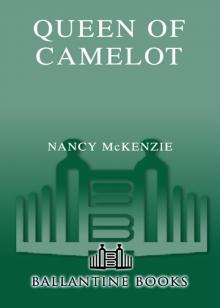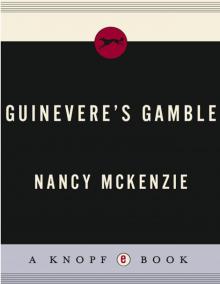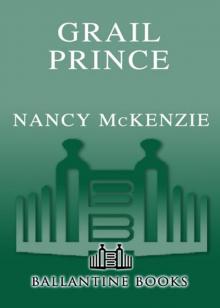- Home
- Nancy McKenzie
Prince of Dreams Page 12
Prince of Dreams Read online
Page 12
This graceful speech produced a few murmurs among the men, and Percival allowed himself a smile. “You wear the Boar of Cornwall, sir. That is good enough for me.” He spread his arms out to embrace the sea, the harbor, the hills. “Welcome to Gwynedd, Tantris of Budeca. May your stay here be a pleasant one.”
A groom led horses forward, and he and Percival mounted for the ride up to the castle, the Welsh troops and Cornish escort walking warily behind. As they rode, Tristan gave Percival what news there was from Camelot, of longboat sightings and unrest along the ever-lengthening Saxon Shore, of Irish landings along the Cornish coast. In turn, Percival told him of tidings from the north, how the Picts had attacked all winter along the borders of Lothian and Strathclyde. Picts were a fierce and relentless people who feared nothing now that Arthur was gone from Britain.
“And how,” Tristan ventured, “do the other Welsh kingdoms welcome my visit, and the marriage of your daughter to Markion?”
Percival’s eyes crinkled in a smile, although his face was grave. “You are direct, my lord Tantris. A trait we Welsh appreciate. Most men would not ask such a question until we met in the council chamber, well after the feasting and the bard.”
“I beg your pardon, my lord. I am not much used to diplomacy. But I have an interest in your answer, as I feel, even now, eyes upon my back.”
Percival grinned. “You are observant as well, I see. But I doubt you are in real danger. Dyfed is with me, and Northgallis. Powys does not like it but will lift no hand to resist.” He paused. “For obvious reasons, Guent is against it.”
Guent. Marhalt’s homeland. Tristan nodded. “You will not think me overly direct if I ask you, are there any men from Guent about?”
Percival chuckled. “I’m not fond of diplomacy myself. I’d rather say what’s on my mind than feast and chat and drink and beat about the bush. No, there are no men from Guent about. I’d know if there were.”
“My lord is gracious to be so patient with me. But if you don’t care much for diplomacy, I fear we owe you an apology for the winter we’ve put you through.” Percival shot him a quick look full of amusement. “I understand we sent you our finest expert on feasting and chatting and beating about the bush. Er, how did you like Segward?”
Percival laughed outright. “You put me in a difficult position, sir. I can lie like any diplomat and say what a Cornish prince must want to hear, or I can tell you the truth and insult my honored guest. Tell me, Tantris, which shall it be?”
Now it was Tristan’s turn to smile. “In Cornwall, we call him the Snake. His mind has more turnings than a serpent’s path.” He inclined his head politely. “You cannot offend me, my lord. I am no ordinary envoy.”
Percival’s glance sharpened. “So I have perceived.”
“I come out of allegiance to Mark, out of a strong desire to hear your bards and learn your music, and—” He paused and colored slightly. “Out of a lifelong desire to meet you, my lord.”
Percival’s gaze was direct. “Why?”
“I’ve heard so many tales of your exploits. All the bards sing your praises, even in Cornwall. And if they tell true tales, you knew Sir Galahad.”
“I did.”
“And do you know what became of him? Each bard I hear tells a tale with a different ending. Did he really die when he found the Grail?”
Percival’s smile was enigmatic. “He always was a complicated man. Have you never been to Less Britain, Tantris?”
Tristan was about to tell him Lyonesse was not far from Less Britain, two days’ sail in a stiff wind, but he remembered just in time to hold his tongue.
“I’ve never been anywhere, my lord. If my birth would allow, I’d be a bard. I’d rather spend my days harping and making music than riding to war.”
“Ah,” Percival breathed. “Then that’s why we’ve never heard of you.”
Tristan’s lips twisted in a smile. “Not much fuss is made about anyone but Markion in Cornwall.”
Percival lifted an eyebrow. “Why do you ask about Galahad?”
“Because he, like you, was among the last of the great warriors, the Britons the bards sing about. You both fought with Arthur. You lived in his time. You knew what it was possible for men to accomplish.”
Tristan spoke with passion, and Percival grew grave. “Yes,” he said slowly. “We know what can be done. And so does Markion, or you wouldn’t be here.” He turned in the saddle and looked hard at Tristan. “I love my daughter, Tantris, more than my wife, more than either of my sons. Melleas and Logren are good, ordinary boys. But my daughter is something special. I would not willingly part with her for any price. If I had not known Arthur, if I did not think Markion shared the dream I dream, I would never let her leave Gwynedd. Tell me, Tantris, if Segward the Snake spoke the truth of this, or no.”
“Markion shares your dream,” Tristan replied quickly, noting the fierce light in the Welshman’s eyes. Here was a man of Mark’s mettle. They had better be allies, or they would make deadly enemies.
Percival nodded stiffly. “It will be done, then.” They passed through the outer gates at the head of the procession and into a large courtyard paved with stone. Percival brought his stallion to a halt as grooms appeared and took the reins. “Of course, her mother is against it.”
Tristan swallowed. “She is? Why?”
Percival shot him a sharp look. “How not? She’s Pelleas’s daughter. Marhalt was her brother. But I’ve fought that battle for you. She will be tame about it.” He slid from the saddle, unaware that Tristan was staring at him.
“The queen—your wife—is Marhalt’s sister?”
Percival frowned. “Certainly. How could you not know? Lord Segward and I discussed how it was to be handled.”
Of course Segward had known! Tristan recalled the parting ceremony and Segward’s smug smile of farewell. But surely Markion himself could not have known it. He gulped audibly. “He probably told you the less said, the better.”
“Exactly. His very words.”
“Dear God,” Tristan breathed, “have mercy upon my soul.”
But the troops were coming up all around them and Percival did not hear him. Then, out of the din of murmurs, one voice rose loud above the others.
“I challenge you, you filthy Cornishman! I challenge your right to wed a Welsh maid!”
Heads turned. From the group of companions behind the king a large young man stepped forth, dressed for battle in a brass-studded tunic and leather helmet. His naked sword flashed in the morning light.
“Palomydes!” Percival thundered. “I’ll have your tongue out of your head for this! Guards!”
But Palomydes did not waver. His sword pointed at Tristan’s breast and his angry eyes never left Tristan’s face. “I’m within my rights, my lord, as Essylte’s suitor, to challenge this foreign bastard.”
“You were sent home and forbidden to set foot in Gwynedd,” Percival said acidly. “And you are not her suitor. She is promised to the High King of all Britain.”
Still Palomydes ignored the surrounding guards. “The queen accepted my suit, sir, although you did not. I have the right to challenge this lowborn Cornish spawn. Look at your men, my lord. Look at their faces. See how many of them welcome this foreigner on our soil.”
Percival swiftly surveyed his troops. Even Tristan could see they were reluctant to arrest Palomydes. Most of them looked eager for a good fight.
White-faced, Percival moved bodily in front of Palomydes. “By God in heaven, I will not stand for this. Arrest him, you cowards, or I’ll do it myself!” He whipped his sword from its ceremonial scabbard and a collective gasp went up from the crowd. The King of Gwynedd had drawn his sword against one of his own countrymen to defend a foreigner. Tristan saw shock register on even the most loyal faces.
“Be easy, my lord king!” he called out, jumping down from the horse. “I recognize his right to challenge me. With your permission, we will settle this here and now.” Gathering his cloak in his left hand, Tristan d
rew his sword with his right. Palomydes snarled in satisfaction. Percival glared first at Tristan, then at Palomydes, but it was already beyond his power to control. The Welshmen, cheering, cleared a large circle and waited, eager and expectant, for the fight to begin.
“Fools, both of you!” Percival snapped. “The future of all Britain lies in your hands today.” A sharp look at Palomydes. “If you kill him, Palomydes, you will die.”
“I won’t kill him,” Palomydes growled. “But I’ll disarm him. And if I take his sword, then he goes back where he came from.”
“You would start a war with Cornwall?”
“To keep your daughter in Wales, my lord, I would.” Thin cheers rose from the soldiers, silenced as soon as Percival glanced their way.
“And if I take your sword,” Tristan countered, “then you are the one who goes home.”
“Agreed.”
With a shrug, Percival backed away. Slowly, Tristan and Palomydes began to circle. The Welsh troops sang out encouragements and threats; the Cornishmen huddled silent on the edges of the throng. And everywhere men wagered coins, beads, rings, and buckles, whatever valuables they could lay their hands on, for or against one prince or the other.
With a flick of his wrist Tristan wrapped his cloak about his forearm. As he expected, Palomydes lunged. Dodging him neatly, Tristan aimed a thrust at the Welshman’s waist; the blade struck a brass stud and slid off. The crowd roared at the first hit; wagers were paid in an undercurrent of furious cursing. Tristan emptied his mind of thought and let his body guide him, aware only of the firm courtyard stone beneath his boots, the wan warmth of the young sun, the cool morning breeze against his newly shaved cheek, and the familiar, welcome stretch and bunch of muscle beneath the soft slide of fabric. And, as always, the nagging burning in his side.
Within moments, he realized Palomydes was fighting not to disarm him but to cut him. The man hardly bothered with swordplay. He took every chance he got to lunge straight in. Blow after blow Tristan blocked with ease. For a swordsman, the big man was clumsy, and unlike Marhalt, he was slow. Tristan leaped and glided around him, avoiding his thrusts, landing cutting blows to his arm and shoulder, waiting for him to tire and yield. At last, blood streaming from his sword arm and sweat running from his helmet into his eyes, Palomydes cursed viciously and threw himself at Tristan. Tristan sidestepped and knocked the sword from his hand. Palomydes landed on stone and lay there, gasping. At the back of the crowd the Cornishmen cheered wildly.
Tristan bent to retrieve Palomydes’s sword. As he lifted it into the light he saw a stain upon the tip, as if it had been lightly dipped in resin or painted with—He whirled to face Palomydes, who was pushing himself up. Palomydes, accepted by the queen as husband for her daughter. The queen, Marhalt’s sister. Marhalt’s sword, tipped with poison. He understood now who his enemy was.
In the silence Percival came forward, his eyes fastening on Tristan like an eagle’s on its prey. Tristan realized the king was not the only one to have seen the flash of truth behind the disguise.
“You lied to me when you said you were no warrior. Who are you?”
They stood alone, face-to-face, in the middle of the circle. No one else had heard the question. Beyond them, still gasping, Palomydes pushed himself to his knees.
“Who are you?”
Tristan sheathed his sword and said nothing.
Percival’s eyes slowly widened, and he paled. “My God.”
Bowing, Tristan offered up the captive sword. “On Markion’s behalf, my lord king, I give you back your dream. It does not matter who I am.”
Percival hesitated, searching his face. At last he accepted the sword and nodded. “You are a brave man. You are welcome in my household. But I—”
A sharp gasp went up from the crowd. In the same instant, Tristan felt a searing pain between his shoulders.
“Coward!” “Blackguard!” “Shame!” the soldiers cried. Tristan staggered. His mind raced. He knew the feel of cold steel. He recognized that deadly burning. The man had thrown his dagger at his back. What was it Pernam had told him? There was no cure—the poison would have killed him had he not killed Marhalt.
“Great Mother!” he whispered. As he fell, he turned, whipping his dagger from his belt. It caught Palomydes in the throat.
10 THE SICKROOM
Queen Guinblodwyn stood at the head of a narrow bed, looking down at the prostrate body of a wounded man. Sunlight flooded the little room. In a corner two servants had a fire going in the grate and a pot of water bubbling noisily on a tripod stand above the flames. Expressionless, the queen turned to the two girls at her side.
“It is my right to nurse him. As queen, it is my right.” Essylte and Branwen nodded hastily. “But you heard the king’s order. It is left for you to do.” A thin smile crossed her lips. “He shames me by it, as this villain has shamed Wales by killing the Prince of Powys. Even so, I would have done my best for him. I would have cured him. But now—now I leave him to you, Essylte. We will see how much of healing you have learned.”
“Yes, Mother.”
“Branwen, you will report to me daily on his condition.”
“Yes, my lady.”
The queen turned to a small table where two jars had been set out, a mortar and pestle, a bottle of oil, and a small green linen bag. “I trust you remember how to mix the balm. I’ve had him stripped and washed. He will do better if he stays on his stomach. Oil his back daily to keep the skin soft. Remember, Essylte, first the hot cloth on the wound, as hot as he can bear. Don’t be squeamish. Then the balm.” Her hand dipped into her pouch. “I grant you access to my workroom to fetch any drug you need. Here is the key. Guard it well.” Her lovely eyes narrowed in amusement. “May the Goddess be with you,” she breathed, half laughing, as she turned and left.
Essylte looked at Branwen. “What’s so funny?”
“She doesn’t think you can do it. She thinks Percival’s order will serve her own ends, not his.”
Essylte looked down at the long body covered by a linen sheet. All she could see of his face was a tangle of dark hair. “It would suit her purposes if I failed? Then I must not fail. Father wants him to live so desperately. . . .”
“If he dies, you—we—will not go to Cornwall,” Branwen said slowly.
“And then I’ll be made to marry some Welsh prince five leagues from home. I’ll be under her thumb forever.” She gestured at the still body. “He’s my pass to freedom. Will you help me heal him, Branny? You know much more of this than I.”
Branwen nodded slowly. “I’ll help you. If it can be done.”
“Do you think he is past our help? He doesn’t look it to me.”
“I think your mother, the queen, is keeping some secret from us. A secret she doesn’t think we’ll ever guess.”
“Well, that wouldn’t surprise me. Do you think it’s a secret we’ll need to know to heal the Cornishman?”
Branwen shrugged. “I don’t know. But it’s odd, isn’t it, that she said she could cure him, whereas when she spoke about you she spoke of healing.”
Essylte frowned. “Are they not the same?”
“I’m not sure. Perhaps they are not.”
“Well,” Essylte said firmly, “I’m going to do my best. I’ve learned more than she thinks I have. But stand by me, Branny, while I have a look at his wound.”
She walked to the head of the pallet and slowly pulled back the sheet. There, in the middle of his back, was a clean cloth, and underneath, a narrow, sharp-edged cut seeping dark red blood.
“It doesn’t look so bad.”
“But it’s deep,” Branwen said. “And we must get the heat and the balm down inside it.”
“How?”
“Use your fingers to pull the edges of the wound apart.”
Essylte shuddered. “Won’t he feel it?”
“Not now. He’s drugged.”
Gently, Essylte placed her hands on the Cornishman’s back. She was amazed at how hard his flesh w
as. It did not yield to gentle pressure. She had to force the edges of his wound apart. Blood oozed up, thick and glossy. “Ughhh!”
“That’s fine. Nep, Lea, the hot cloth.”
Branwen took the tongs from the servant and lowered the steaming cloth onto the wound. The stranger groaned.
“It’s burning him!” Essylte cried, reaching for the tongs.
Branwen held her arm. “Let be. He needs the heat.”
“But won’t it scald his flesh?”
“Not much. The wound must heal from the inside out. We can’t let his flesh close until the heat and balm have healed the inside. Otherwise he’ll fester. Don’t you remember old Finn the smith, who stepped on a nail?”
“I certainly do. It was disgusting.”
“Your mother said that was the reason she could not save him. The flesh was healed, but the wound was still dirty. The festering spread all through him.”
Essylte looked down at the inert man on the pallet, the tousled hair, the strong, wide shoulders, the long, muscled arm that bent to frame his face. “I want to save him.”
“Then hold that there while I mix the balm.”
Branwen went to the mixing table and began her preparations. Essylte dabbed at the bleeding wound with the cloth and used the tongs to keep the hot compress in place. The stranger had ceased his groaning and lay senseless beneath her hands. His dark hair was well cut and soft to the touch, thick and fine with a small curl at the ends. His face lay buried in the pillow, but the ear that showed was delicately scrolled and well set. The hand that hung over the pillow had long, lean fingers and a wide palm. The little finger wore a blue enameled ring. One long, well-muscled arm was gracefully flung—
“My lady, watch the hot cloth! What are you attending to?”
Essylte blushed as she retrieved the bloody compress. “Who is he, anyway? He must be highborn. He’s too well made to be just anyone.”
“Of course he’s highborn. He’s King Markion’s proxy. It would be an insult to send anyone less than the foremost of his kin.”

 Guinevere's Gift
Guinevere's Gift Queen of Camelot
Queen of Camelot Guinevere's Gamble
Guinevere's Gamble Grail Prince
Grail Prince Prince of Dreams
Prince of Dreams